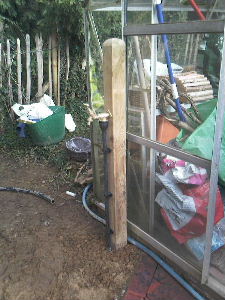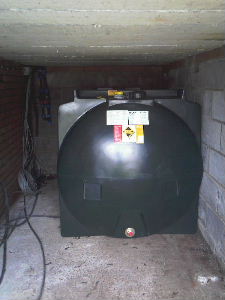Rainwater Harvesting Systems
Don't let rainwater go to waste!
Rainwater harvesting systems are an excellent way of reducing your mains water consumption and cutting down on your water bills! Rainwater is simply collected from the surface of your roof to be stored in a rainwater storage tank.
The stored water is ideal for garden watering,
car washing, and all those outside jobs. It can be fed to outside taps
or standpipes around the garden, incorporated into a full irrigation system
or simply accessed from a tap on the tank.
We are happy to install any size tank and system for you. Please
call David on 07725 634816 to discuss your requirements and to arrange
a free quote.
 Rainwater Storage Calculations
Rainwater Storage Calculations
Table 1 gives an idea of the amount of water systems can yield
with different roof areas and rainfall volumes. We generally assume that
only 60% of the rain falling on the roof is collected and used. This is because
there may be times when the tank is full and unable to collect any more rainwater
or there may be insufficient demand to use all of the water collected.
Table 1:
Approximate annual yield of rainwater in cubic metres per year for a range
of roof sizes with varying rainfall.
Plan roof area
m2
| mm rain/year |
50 |
75 |
100 |
125 |
150 |
| 500 |
15 |
22.5 |
30 |
37.5 |
45 |
| 1000 |
30 |
45 |
60 |
75 |
90 |
| 1500 |
45 |
67.5 |
90 |
112.5 |
135 |
| 2000 |
60 |
90 |
120 |
150 |
180 |
Table 2 gives a summary of different drainage factors for different
roof types. A factor of 1 indicates all the water that falls on the roof
will reach the gutter, a factor of 0.5 indicates that half the rain falling
on the roof will reach the gutter.
Table 2:
Drainage factors for different roof types.
| Roof type |
Drainage factor |
| Pitched roof tiles |
0.75 – 0.9 |
| Flat roof smooth tiles |
0.5 |
| Flat roof with gravel layer |
0.4 – 0.5 |

Tank sizing
Tanks and systems vary enormously in size and complexity but in general we would advise you to opt for the largest tank possible for your location. This allows the greatest storage volume, flexibility of use and long term savings on mains water usage. Tanks can be screened, hidden in garages, partially buried and fully buried depending on their size and the layout of your property.
As a guideline, size the tank to hold 18 days worth of demand, or five per cent of annual yield, whichever is lower. To calculate the optimum tank size, first calculate the potential yield. Once you know the potential yield, simply find five per cent of this.
Calculating the tank size
The formula below can be used to calculate the optimum tank size for a
rainwater harvesting system
Roof area (m2) x drainage factor
x filter efficiency x annual rainfall (mm) x 0.05
Example: A property with a roof area of 100 m2. This
is a tiled, pitched roof, so has a drainage factor of 0.9 is used (see table
2). The filter efficiency is assumed to be 90 per cent, so a filter efficiency
factor of 0.9 is used. Annual rainfall is assumed as 905 mm per year, the
1961 to 1990 long run average from Met Office data for England and Wales
(in a real example local rainfall must be used, as rainfall varies significantly
across England and Wales).
Summary of parameters for yield calculation
| Effective collection area (m2) |
100 |
| Drainage factor |
0.9 |
| Filter efficiency factor |
0.9 |
| Average rainfall (mm/yr) |
905 |
| Five per cent of annual yield |
0.05 |
Tank size =100 x 0.9 x 0.9 x 905 x 0.05 = 3665 litres or 3665/1000
= 3.7 cubic metres (m3)
Using these parameters the optimum tank size is 3665 litres or
3.7 cubic metres.
Clear as muddy water? If in doubt please call David Peacock for
further information and advice: 07725 634816.
The Environment
We welcome your comments, ideas and suggestions on how we might improve our environmental activities.
Kent ~ Irrigation Kent ~ Irrigation Surrey ~ Irrigation Sussex ~ Garden Irrigation Systems ~ London Irrigation
 Peacock Irrigation
020 8464 9964
Peacock Irrigation
020 8464 9964